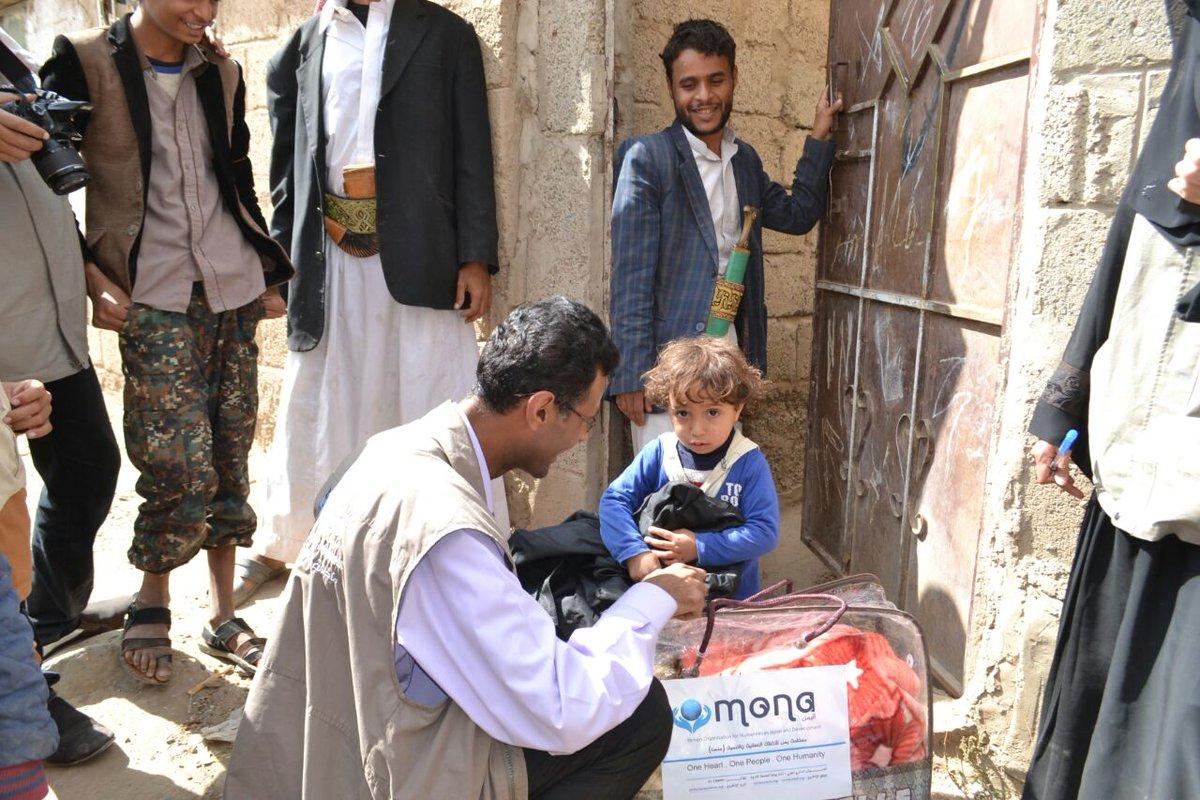Fatik al-Rodaini of Mona Relief, partnering with UN Migration Agency (IOM) in Yemen, distributes hygiene kits and blankets to displaced families in Sanaa, December 2016.
Fatik al-Rodaini has people to feed this holy month of Ramadan. He and his team of volunteers are delivering food baskets to people who would otherwise have nothing for iftar, the nightly meal when families break their Ramadan fast.
"After 15 hours of fasting you need something to break your fast, as a gift you give yourself,” says Rodaini, a Yemeni man who left a career in journalism to work full time helping to relieve Yemen’s hunger problem. His organization, Mona Relief, is named after a woman who was an early donor. The Mona Relief team identifies families in need and delivers food packages or baskets, each one consisting of basic cooking ingredients.
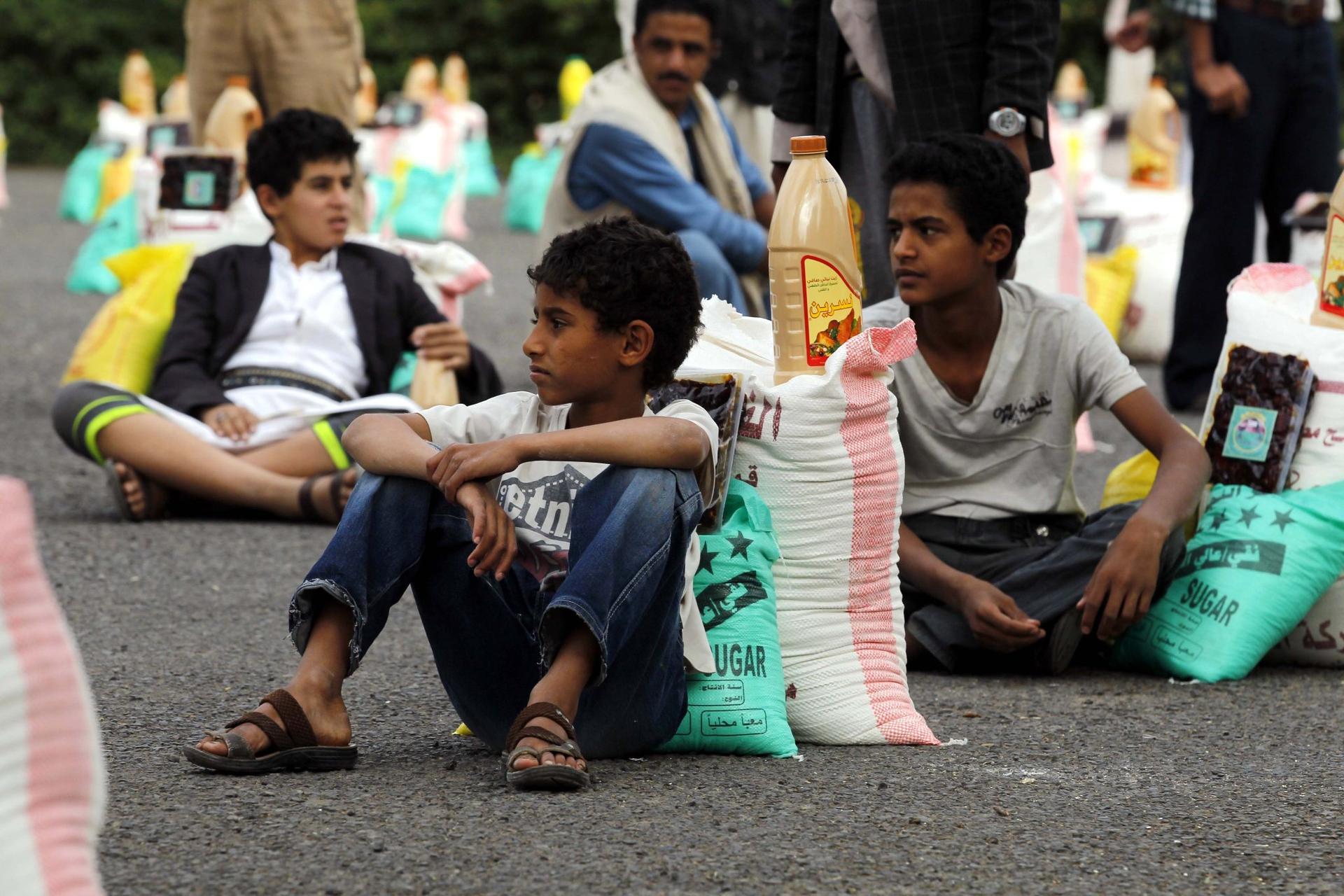
The Mona Relief basket has been adapted for Ramadan:
A 55-pound sack of flour
11-pound bags of rice and sugar
4 pounds of dates (special for Ramadan)
A 2-pound tin of powdered milk (special for Ramadan)
A 2-liter jug of cooking oil
Rodaini says this can keep a family of six fed for up to a month. Mona Relief serves communities across Yemen’s northern, Houthi-controlled region. On a good day, Rodaini will deliver food for several hundred people.
But 17 million Yemenis are hungry. “That's 2/3 of the country's population,” says Abeer Etefa of the World Food Program. “We have the largest food crisis in the world in this country,” she says. “Almost half the population is on the edge of famine. … It's just a huge crisis.”
"That could push the situation, actually, into a famine."
The situation
Yemen grows little of its own food, and must import 90 percent of it, but the war has severely limited imports. A naval blockade by Saudi Arabia, with US support, slows maritime traffic and imposes time-consuming inspections. Damage to the country’s largest deep-water port, Hodeidah, has further slowed World Food Program deliveries.
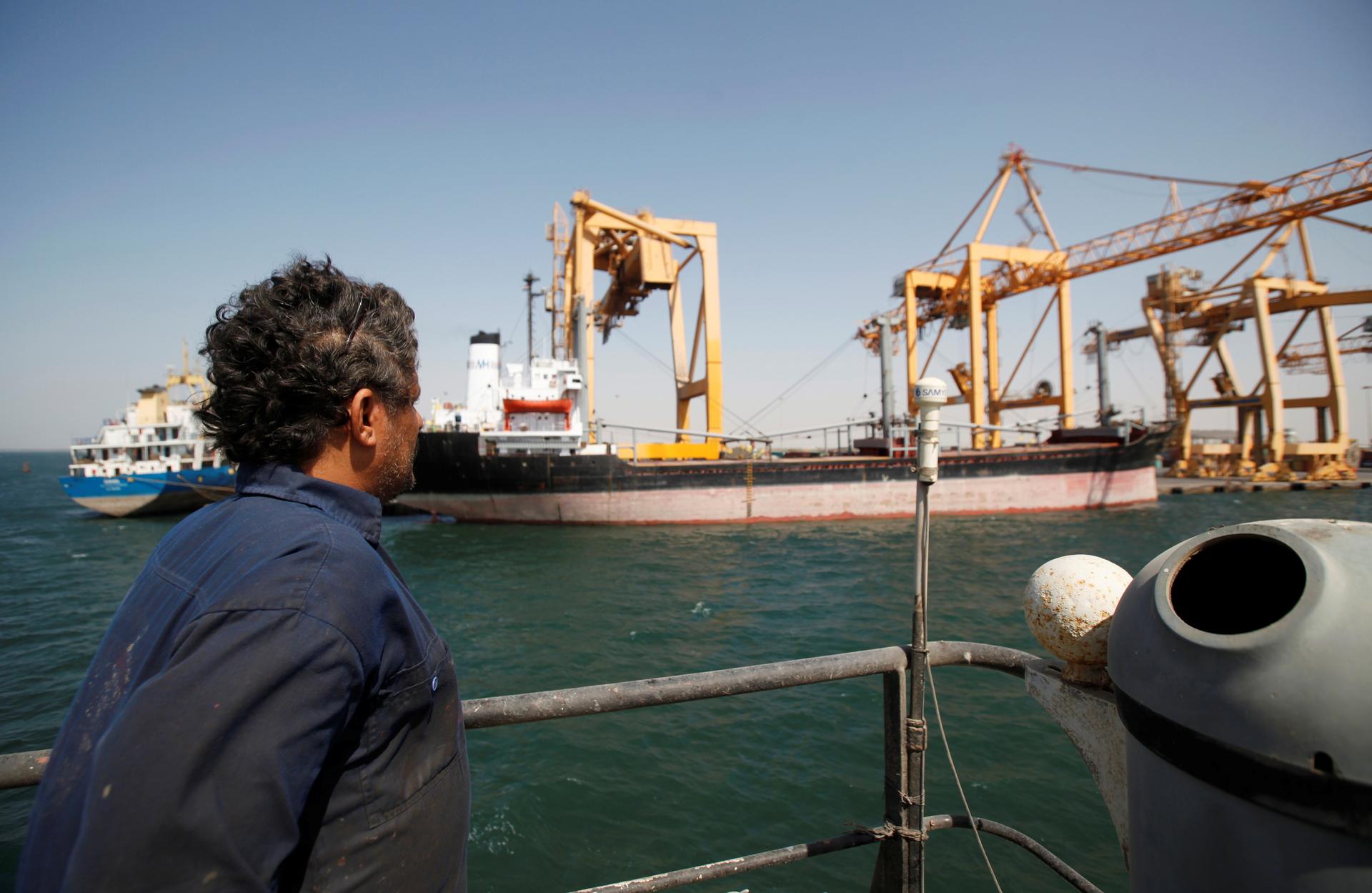
"Ships can be at sea for three weeks waiting for their turn to get to the platform and be able to off-load the cargo and the food,” says Etefa. “In this situation when you have ships carrying food in 50-degree heat [that’s over 120 degrees Fahrenheit], there is … the risk of some quantities of the food going bad." Most of the hundreds of thousands of tons of food that WFP sends into Yemen arrives wholesome and fresh, albeit slowly.
The recent threat of an invasion of Hodeidah by the Saudi-led coalition of Arab countries has put aid agencies on high alert. “It is absolutely essential to continue to have the port of Hodeidah operating," says the WFP's Etefa. "That could push the situation, actually, into a famine if we have any closure of this port."
The Saudi-led coalition, which supports one side of Yemen’s civil war — and controls all of Yemen's airspace — has bombed roads and bridges that connect Yemen’s major cities continually for 27 months. Military forces loyal to the opposing side of Yemen’s civil war make many roads impassible by laying land mines. Everywhere in Yemen, road travel is restricted by armed groups working for not just the warring sides, but for tribal groups — and even al-Qaeda.
“Once the food arrives at the ports it gets loaded into trucks, and then it has to make the difficult journey of passing through different places around Yemen where the infrastructure is not good, the roads are really damaged, no security, multiple checkpoints,” Etefa says.
Recently, a WFP truck convoy was stopped by Houthi forces who control the route from Hodeidah to Taiz, Yemen’s second-largest city. Officials say the 200 trucks were allowed to continue after an inspection.
The International Committee of the Red Cross experiences the same kind of scrutiny, wherever they travel in Yemen. Even as a cholera outbreak and near-famine conditions require a speedy response, ICRC officials must be prepared to negotiate their cargo's passage.
“When we send convoys from one location to the other … we have to inform the tribes that a convoy will be passing through their villages. We also have to negotiate the way at every checkpoint to make sure that the convoy will reach where it is supposed to deliver," says the ICRC’s Robert Mardini. "And I think this has proven to be effective.”
“All this is a direct consequence of a conflict which is entangled, with no solution in sight … and where the basic rules of war are not respected by parties to the conflict," says Mardini, ICRC’s regional director for the Near and Middle East.
“We have 380 persons working in Yemen,” says Mardini. “In Sanaa, in Saada, in Aden, in Hodeidah — [they are] trying to make a difference on the ground, and they are bearing witness of terrible suffering … of Yemeni people from north to south." This includes an estimated 2 million internally displaced persons, IDPs, who have fled their homes to escape fighting.
The ICRC and the World Food Program operate on a massive scale, working with local partners to deliver aid to most parts of the country, with the capacity to serve millions of Yemenis, both IDPs and residents. But they can do only so much with limited support from the international community.
"Food aid is not pouring into Yemen," says Abeer Etefa of the World Food Program. "Yemen is a forgotten crisis. For many a month, we have not been able to get food to the families that need help, so out of the 17 million people, we're only assisting 3 million people. We're providing them with only one-third of the food ration."
Shipments blocked
Small local groups, such as Rodaini’s Mona Relief, don’t import food themselves. Instead, they buy food already delivered to local vendors by Yemeni merchants who have long-established distribution networks.
"I can't receive any shipment from abroad. So, I'm trying to buy food baskets from the local markets, and then I distribute it to the IDPs and the vulnerable families in Sanaa and in other provinces,” says Rodaini. “Mona Relief is working now in nine provinces. Most of them in northern Yemen.”
One sad irony in the Yemen story is that families who live in port cities, where food is off-loaded from foreign ships, may nonetheless be starving.
The Red Sea port of Hodeidah is controlled by the Houthis, a militant religious group whose home is along the Saudi border. The southern port of Aden is controlled by northerners loyal to Abed Rabbo Mansour Hadi, the Yemeni president-in-exile. Neither authority is maintaining a social safety net for people in their territory. Some critics believe officials working for both of Yemen's governments are skimming food aid when it enters the country.
“I think that the international aid that comes through the official authorities do not reach the targets, due to widespread corruption, unfortunately,” says Qasim al-Mahbasi, a university professor in Aden who is also the honorary president of Future Foundation for Development and Human Rights.
“The support of traders and NGOs is better than that of international organizations,” he says, “but remains limited in value [compared] to the growing needs of a large number of [Yemen’s] poor.”
'Each family slaughters its own goats'
Like Mona Relief in the north, the foundation supports southern families in need. It, too, is delivering food to feed families this Ramadan.
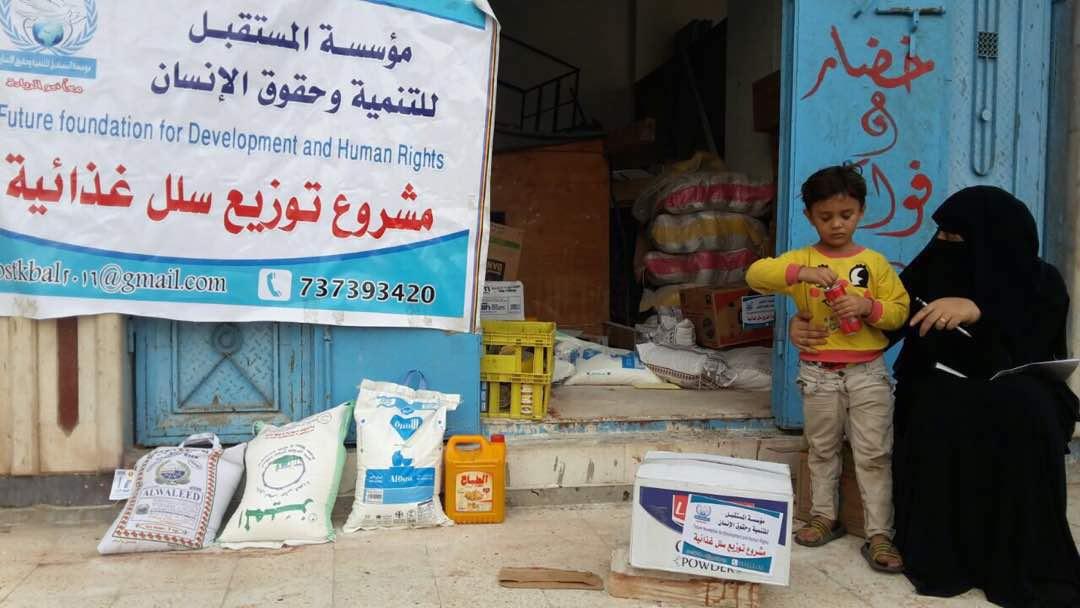
The Future Foundation is providing outfits for Yemeni children to wear for Eid al-Fitr, the festival that follows the fasting month of Ramadan. The group is also buying goats, as it did last year, which it will provide to families unable to buy their own to sacrifice in a religious observance.
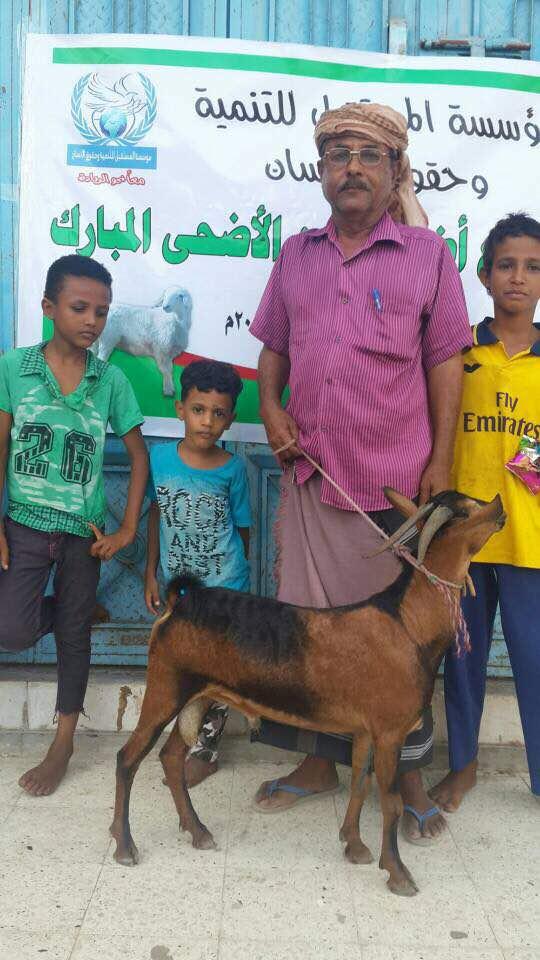
In normal times, families consume one part of the goat meat themselves, another part goes to friends, and the last third is given to the poor. But with poverty reaching into Yemen’s middle classes, families are encouraged to keep all of the donated meat to share among themselves.
“Each family slaughters its own goats and cooks them as they wish in their own home,” he says.
Humanitarian agencies know that food aid, be it kitchen staples or sacrificial goats, is widely shared.
"Yemeni families are tribal,” says Etefa. “They need every amount of food that they can get. They are sharing the food rations that they receive every month. That's how they survive.”
The price of survival
Observers say near-famine conditions are a product of Yemen’s civil war, including a banking crisis that affects middle-class Yemeni families who have no previous history of starvation.
"The lack of a functioning central bank has left most of the 1.2 million Yemenis employed in the public sector without a paycheck since August [2016],” reports the Sanaa Center for Strategic Studies, an independent think-tank. “As heads of households they are the breadwinners for as many as 6 million people."
“Middle class families, who used to be government employees receiving salaries every month … today, they have nothing,” says Etefa. “They only have bread to survive on.”
"These were government employees, you know. College graduates, who used to receive a salary from the government are no longer able to receive that, which is definitely impacting their ability to put food on the table for their families,” says Etefa.
“In addition, the economic situation in Yemen is deteriorating fast, so there are no more jobs in the private sector that would absorb all — or any — of these people. I have met, myself, many families of people who used to lead a good life and are no longer able to put food on the table, to buy food from the market — that's very expensive, and they don't have money to buy food.”
Yemen's banking crisis, like the civil war itself, is complicated by politics. On Sept. 18 last year, President Hadi fired the head of Yemen’s central bank. Hadi ordered the central bank’s headquarters to be relocated from the rebel-held capital, Sanaa, to the southern port city, Aden, which was mostly under his control. Yemen’s oil revenues and international loans would now be deposited in Aden, where Hadi appointees are in charge. Since then, many Yemenis in the north and the south have complained that they are not being paid.
Sanaa-based journalist Hussain al-Bukhaiti places the blame squarely on the Yemeni president, who tinkered with the nation’s central bank. "The way [salaries] used to be paid [under] the government of the Houthis … all wages were paid to every corner in Yemen, even areas under the control of al-Qaeda.”
This mock-up of a wanted poster demands President Hadi be brought to justice for depriving government employees of their paychecks.
Other voices, less critical of the Yemeni president, still point to Yemen’s banking crisis as a major contributor to hunger across the country.
Albert Jaeger of the International Monetary Fund — a global organization that observes strict neutrality in conflicts, including with regards to Yemen — says, “The root of the non-payment of salaries was not relocation." Jaeger says the problem is less about who controls the central bank, and more about how little money is in it. “To avoid famine conditions, Yemen needs urgently foreign exchange grants from donors to pay for import of food; the proceeds from selling that imported food in Yemen could be used to pay public salaries in all of Yemen."
The World Food Program, which assesses economic conditions across Yemen on a monthly basis, has found an increase in the number of people who are joining the ranks of the hungry, Etefa says. “There is a direct correlation … between the increasing numbers and the fact that a lot of people are no longer able to receive their salaries.”
Mona Relief's Fatik al-Rodaini has seen the impact of lost wages across the areas where he delivers food. “And lately, I have seen many families selling their furniture," he says, "selling it to give their children food — or they will die.”
In March, Rodaini conducted a survey of 200 families in the Marib region, in eastern Yemen, near one of the front lines in the civil war. He filmed his visit to two IDP families who have moved their families into caves, living close to one another to provide defense against wild animals.
Who is affected
Hunger has its cruelest impact on the most vulnerable Yemenis.
“The situation is really terrible,” Taiz-based journalist Mohammed al-Qadhi said via WhatsApp on June 2. “A lady with her two daughters committed suicide by drinking poisonous liquid two days ago in Ibb [in central Yemen] as she had nothing and could not go begging for help,” he says. “Several weeks ago, a man who had not received his salary took his furniture to the street and burnt them down.”
Suha al-Mujahed, who grew up in Taiz but was forced to leave because of the war, now works with an aid group funded by UNHCR, the United Nations refugee agency. Her program provides cash to Yemeni families who have lost everything.
“Last week, we visited a household with five children and a pregnant wife,” she says. The father told Mujahed that he is a teacher, but he had not been paid for the past eight months. “The house owner gave them a notice that they need to leave the house if they didn’t pay the accumulated rent,” she says. “The wife mentioned that the last thing they had was her wedding ring, and they sold it for food.”
Mujahed says last year, her agency was giving unconditional cash grants to the needy. This year, families must demonstrate they are in danger of being evicted. “So, the rental subsidies we provide for those families is just emergency aid,” she says. “It can't be a solution.”
But there are still signs of hope, albeit on an incredibly small scale.
Ahmad Algohbary, a student whose education was interrupted by the war, has found a way to combine humanitarian work with his longtime passion for photography. He regularly travels around Yemen, documenting the lives of Yemenis as they confront the hardship of war.
“I had posted a photo of a child named Jamal on Twitter,” says Algohbary. Jamal, like many undernourished children now in Yemen, had become seriously underweight and in need of medical attention. A woman who saw the post contacted Algohbary to ask what she could do for the child. She wound up paying Algohbary to take Jamal to the doctor.
“I went to Saada,” says Algohbary. “I took him from his village to the nutrition center. After one month after he got treatment, I published his photo, and it was really great.”
Algohbary, buoyed by Jamal's recover, found another opportunity to help. “I took a photo of a girl, her name is Batol. People donated for her through Western Union and [a] minigrant. They sent money to me. I went back again to Batol's village,” he says, “and took her to the nutrition center, and now Batol looks better than before.
"I think today, clearly Yemenis are caught between a rock and a hard place," says Robert Mardini of the ICRC. "The only solution is a political solution. Hopefully, parties will sit around the table and start discussing, again, a political settlement. It's high time for this to happen, of course, but it's higher time to have parties respect the basic rules of war."
This story was updated Tuesday, June 13, with additional reporting about Yemen's banking crisis. A previous version of the story implied, by context, that the International Monetary Fund was in some way critical of Yemeni President Abed Rabbo Mansour Hadi. The IMF is politically neutal.
